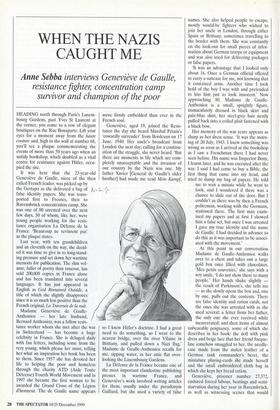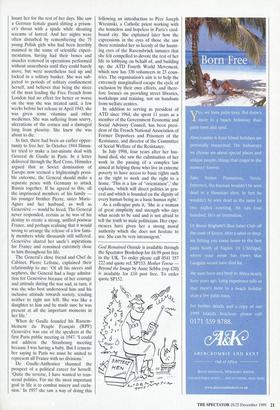WHEN THE NAZIS CAUGHT ME
Anne Sebba interviews Genevieve de Gaulle, resistance fightet; concentration camp survivor and champion of the poor HEADING north through Paris's Luxem- bourg Gardens, past Yves St Laurent at the corner, you come to a row of elegant boutiques on the Rue Bonaparte. Lift your eyes for a moment away from the haute couture and, high in the wall at number 68, you'll see a plaque commemorating the events of more than 50 years ago when an untidy bookshop, which doubled as a vital centre for resistance against Hitler, occu- pied the site.
It was here that the 23-year-old Genevieve de Gaulle, niece of the then exiled French leader, was picked up by the Gestapo as she delivered a bag of false identity papers. She was trans- ported first to Fresnes, then to Ravensbrilck concentration camp. She was one of 80 arrested over the next few days, 50 of whom, like her, were young people working for the resis- tance organisation La Defense de la France. 'Beaucoup ne revinrent pas' as the plaque states.
Last year, with ten grandchildren and an eleventh on the way, she decid- ed it was time to give in to long-stand- ing pressure and set down her wartime memoirs for publication. The slim vol- ume, fuller of poetry than rancour, has sold 200,000 copies in France alone and has been translated into several languages. It has just appeared in English as God Remained Outside, a title of which she slightly disapproves since it is so much less positive than the French original, La Travers& de la colt.
Madame Genevieve de Gaulle- Anthonioz — her late husband, Bernard Anthonioz, was a fellow resis- tance worker whom she met after the war in Switzerland — has become a huge celebrity in France. She is deluged daily with fan letters, including some from the very young, which please her most, telling her what an inspiration her book has been to them. Since 1957 she has devoted her life to helping the poor and homeless through the charity ATD (Aide Toute Detresse) Fourth World Movement and in 1997 she became the first woman to be awarded the Grand Cross of the Legion d'honneur. The de Gaulle name appears more firmly embedded than ever in the French soul.
Genevieve, aged 19, joined the Resis- tance the day she heard Marshal Petain's 'cowardly surrender' from Bordeaux on 17 June, 1940. Her uncle's broadcast from London the next day, calling for a continu- ation of the struggle, she never heard. But there are moments in life which are com- pletely unacceptable and the invasion of our country by the Nazis was one. My father Xavier [General de Gaulle's older brother] had made me read Mein Kampf, so I knew Hitler's doctrine. I had a great need to do something, so I went to the nearest bridge, over the river Vilaine in Brittany, and pulled down a Nazi flag,' Madame de Gaulle-Anthonioz recalls for me, sipping water, in her attic flat over- looking the Luxembourg Gardens.
La Defense de la France became one of the most important clandestine publishing presses in wartime France, and Genevieve's work involved writing articles for them, usually under the pseudonym Galliard, but she used a variety of false names. She also helped people to escape, mostly would-be fighters who wished to join her uncle in London, through either Spain or Brittany, sometimes travelling to the border with them. She was constantly on the look-out for small pieces of infor- mation about German troops or equipment and was also used for delivering packages or false papers.
'It was an advantage that I looked only about 16. Once a German official offered to carry a suitcase for me, not knowing that it contained arms. Another time I took hold of the boy I was with and pretended to kiss him just to look innocent.' Now approaching 80, Madame de Gaulle- Anthonioz is a small, sprightly figure, immaculately dressed in black skirt and pale-blue shirt, her steel-grey hair neatly pulled back into a coiled plait fastened with a black bow.
At this point in our conversation Madame de Gaulle-Anthonioz walks over to a chest and takes out a large gold box once filled with chocolates. Wes petits souvenirs,' she says with a wry smile. 'I do not show these to many people.' Her hands shake slightly — the result of Parkinson's, she tells me — as she slowly opens the box and, one by one, pulls out the contents. There are false identity and ration cards, not the ones she was arrested with as she used several; a letter from her father, the only one she ever received while incarcerated; and then items of almost unbearable poignancy, some of which she describes in her book: the doll with pink dress and beige lace that her friend Jacque- line somehow smuggled to her, the needle- case made from the stolen leather of a German tank commander's beret, the miniature playing-cards she made herself and the small embroidered cloth bag in which she kept her bread ration.
Genevieve, prisoner number 27,372, endured forced labour, beatings and semi- starvation during her year in RavensbrOck, as well as witnessing scenes that would haunt her for the rest of her days. She saw a German female guard slitting a prison- er's throat with a spade while shouting screams of hatred. And her nights were often disturbed by remembering the 75 young Polish girls who had been horribly maimed in the name of scientific experi- mentation, having had their bones and muscles removed in operations performed without anaesthesia until they could barely move, but were nonetheless tied up and locked in a solitary bunker. She was sub- jected to periods of solitary confinement herself, and believes that being the niece of the man leading the Free French from London had no effect for better or worse on the way she was treated until, a few weeks before her release in April 1945, she was given some vitamins and other medicines. She was suffering from scurvy, ulcerations of the cornea and a damaged lung from pleurisy. She knew she was about to die.
In fact, there had been an earlier oppor- tunity to free her. In October 1944 Himm- ler tried to make a last-minute deal with General de Gaulle in Paris. In a letter delivered through the Red Cross, Himmler argued that as Soviet domination of Europe now seemed a frighteningly possi- ble outcome, the General should make a separate peace with Germany to attack Russia together. If he agreed to this, all the imprisoned members of his family — his younger brother Pierre, sister Marie. Agnes and her husband, as well as Genevieve — would be freed. The General never responded, certain as he was of his destiny to create a strong, unified postwar France, and perhaps realising that it would wrong to arrange the release of a few fami- ly members while thousands still suffered. Genevieve shared her uncle's aspirations for France and remained extremely close to him throughout his life.
The General's close friend and Chef de Cabinet, Pierre Lefranc, explained their relationship to me: 'Of all his nieces and nephews, the General had a huge admira- tion for Genevieve because of her courage and attitude during the war and, in turn, it was she who best understood him and his inclusive attitude towards society, tending neither to right nor left. She was like a daughter to him and he made sure he was present at all the important moments in her life.'
When de Gaulle founded his Rassem- blement du Peuple Francais (RPF) Genevieve was one of the speakers at the first Paris public meeting in 1947. 'I could not address the Strasbourg meeting because I was having a baby. But I remem- ber saying in Paris we must be united to represent all France with no divisions.'
De Gaulle-Anthonioz shunned the prospect of a political career for herself. 'Quite the reverse, I have wanted to tran- scend politics. For me the most important goal in life is to combat misery and exclu- sion.' In 1957 she saw a way of doing this following an introduction to Pere Joseph Wresinski, a Catholic priest working with the homeless and hopeless in Paris's card- board city. She explained later how the expressions in the eyes of those she saw there reminded her so keenly of the haunt- ing eyes of the Ravensbriick inmates that she felt compelled to devote the rest of her life to lobbying on behalf of, and building up, the ATD Fourth World Movement, which now has 330 volunteers in 23 coun- tries. The organisation's aim is to help the extremely marginalised escape the cycle of exclusion by their own efforts, and there- fore focuses on providing street libraries, workshops and training, not on handouts from welfare centres.
In addition to serving as president of ATD since 1964, she spent 11 years as a member of the Government Economic and Social Advisory Council, has been presi- dent of the French National Association of Former Deportees and Prisoners of the Resistance, and director of the Committee of Social Welfare of the Resistance.
In July 1998, four years after her hus- band died, she saw the culmination of her work in the passing of a complex law aimed at helping those who live in extreme poverty to have access to basic rights such as the right to work and the right to a home. 'This is a law of "orientation",' she explains, 'which will direct politics in gen- eral and which is founded on the dignity of every human being as a basic human right.'
As a colleague puts it, 'She is a woman of great simplicity and strength who says what needs to be said and is not afraid to tell the truth to male politicians. Her expe- riences have given her a strong moral authority which she does not hesitate to use. She can be very intransigent.'
God Remained Outside is available through the Spectator Bookshop for £6.99 post free in the UK. To order please call 0541 557 222 and quote ref. SP153. Mother Teresa — Beyond the Image by Anne Sebba (rrp £20) is available for £10 post free. To order quote SP152.























































































































 Previous page
Previous page